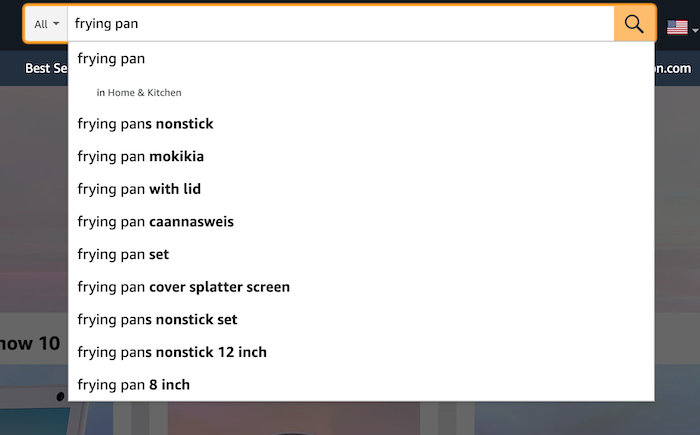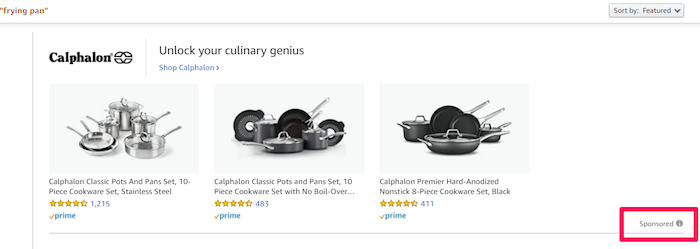
As the world’s largest e-commerce store, Amazon is a platform sellers can’t afford to ignore. But on a website selling over 12 million items, how do you help your products stand out from the crowd with Amazon SEO?
It’s easier than it sounds.
Why? Because Amazon isn’t just an e-commerce platform. It’s a search engine with its very own algorithm, A9.
A Short Introduction to Amazon SEO
Just like other search engines, you can use SEO techniques to boost product rankings. You use certain phrases to boost your discoverability in organic searches, which can increase sales with Amazon.
Here are other ways Amazon acts like a search engine:
- Customers type queries into the search box.
- The Amazon algorithm presents what it thinks are the most relevant results.
- If the results are good, customers won’t go past the first page. Why? Because they’ve found what they’re looking for.
Remember, the whole point of Amazon is to sell things.
Amazon wants to match customers and sellers. They want customers to be happy with the search results so they’ll become repeat customers.
While there’s no guarantee you’ll secure a first-page spot on Amazon, who wants to be on page 20? You’ll never reach your target audience that way.
Let’s look at using keywords for proper optimization of your product pages.
How Do Amazon SEO Keywords Work?
Amazon keywords are the search terms (i.e., words and phrases) that people type into the Amazon search bar.
If you don’t include the right keywords:
- Your target audience won’t find your listing
- Your conversion rate falls flat
- Your discoverability drops
Here’s an example:
Someone searches for a “frying pan.” “Frying pan” is the Amazon keyword. If you’re selling frying pans, but you call them an egg pan, you’ll miss the target audience.
We can take this a step further. “Frying pan” is a good keyword, but it’s may not be enough to hit a first-page ranking. Why?
It’s really broad.
Chances are, customers want more than just a frying pan. Maybe they want one with a lid, or a non-stick pan or a cast-iron frying pan.
Luckily, Amazon’s algorithm understands this. Whenever you type a key phrase into the search bar, other suggestions pop up. Amazon bases its suggestions on other customer search terms, just like Google Autocomplete.

For example, if someone searches for “frying pan”, the first predicted suggestion they see is “frying pans non-stick.”
That’s because other customers often search for non-stick pans…and guess what? You’ve just found yourself another keyword.
The more relevant Amazon keywords you use, the better your chances of reaching your customer base (within reason, but we’ll get to that.)
What have we learned here?
- Amazon keywords are search terms.
- To increase your discoverability on Amazon, you need to include the right keywords in your product listings.
- Some keywords are a little too broad on their own.
- Including a few specific keywords can help you reach your audience base.
Essentially, think of Amazon keywords as another tool in your digital marketing toolbox. Once you know how to use them, they can increase your brand awareness and potentially boost sales.
Is There Anything I Shouldn’t Do With Amazon SEO?
Actually, yes. You shouldn’t use “black hat” tactics.
Black hat SEO is when you deliberately try to manipulate your page rankings using less than ethical strategies. These strategies include:
- Keyword stuffing
- Buying links
- Spam
- Leaving negative reviews on competitor pages to lower their page ranking
Sure, you might get a short-term boost in rankings if you use black hat techniques. But the drawbacks aren’t worth it.
Black hat strategies violate Amazon’s Terms of Service. If Amazon catches you manipulating the algorithms, they could:
- Lower your position within the search results
- Remove your product listings from the search results completely
- Suspend or permanently close your account
I’m very much a believer in sticking to “white hat” or fair SEO practices.
If you’re in this for the long game, then I suggest you do the same.
How to Make Amazon Keywords Work for You
When you’re selling products on Amazon, you want to avoid overusing keywords to diminish the user experience and a high bounce rate.
The high bounce rate metric measures when someone clicks on your listing, takes a look around, and leaves pretty quickly. This action tells Amazon that users aren’t finding what they’re looking for from your product. The outcome? Your discoverability drops, and your product is shown less in Amazon SERPs.
Here’s what you need to optimize to avoid keyword stuffing and a high bounce rate:
Product Title
Always put the most important keyword(s) in the product title. If you’re selling a vacuum cleaner, make sure “vacuum cleaner” is in the title.
The title should include:
- The item’s brand name (this is a super important keyword, by the way)
- A description of what the item is, such as “vacuum cleaner “
- The product color and size
There’s no need to go overboard — remember, you don’t want to keyword stuff.
Backend Keywords
Let’s be honest…sometimes users misspell product names. Or maybe they want a product like yours, but they don’t use the exact key phrase.
You still want these people to find your listing, but you can’t include all these potential keywords in your title.
What do you do to ensure people still see your product?
You put these Amazon SEO keywords in the “backend” of your Amazon Seller’s account.
These are ‘hidden’ key terms added to your listing when you create it. You only have about 250 characters, so use them wisely.
Brand Name
Sometimes people are looking for a specific brand, such as Levi jeans or a Lodge frying pan. For sellers, this means you must include an accurate brand name on your product page.
A bonus? Even if you’re a relatively new brand or seller, you can increase your brand awareness among your target audience by using brand names for the products you sell.
Remember to spell brand and product names correctly; you don’t want people missing product listings because of incorrect names they aren’t searching for.
The Product Listing Description
The product description is where Amazon keywords count. If your descriptions don’t convince people to buy, they’ll bounce off the listing which can naturally decrease your conversion rate.
How do you make the most of this space?
- Bullet points: Use bullet points in the “Technical Details” section. You’re answering FAQs preemptively, such as what makes your product unique? What are your product’s key features?
- Product description: Write a concise, snappy description, including some key phrases you didn’t use in the title. You’re telling buyers why they should move your product into their cart.
- Research: Check out how your competitors write their descriptions. What works, and what doesn’t? Use what you learn for your listings.
How to Pick Amazon SEO Keywords
So you’re ready to list your products online. How do you find the right keywords? And how do you identify the most important keywords?
Here’s what I recommend.
Amazon Keyword Research Tools
Keyword tools do the hard work for you. They pull data from Amazon websites and provide you with various keyword and key phrase options. All you need to get started is a single keyword, such as the product type.
Sonar is a user-friendly, simple option to help you get started — and it’s free to use. You could also check out Keyword Tool for Amazon or Ubersuggest.
Amazon Search Bar
Don’t dismiss the Amazon search bar itself. Simply type in the search term and see what suggestions come up. You can use these keywords in your product listings.
Similar Products
People looking for one product often scope out similar items. Have a look at competitor pages and see what items customers frequently buy in the same transaction. You never know, you might find some keyword ideas.
Google Rankings
Have an e-commerce store outside Amazon? Then check out the popular keywords on Google, too.
Plenty of people start their product search on Google, so why not make sure you’re hitting your SEO from all angles?
Again, tools like Ubersuggest can help with Google keyword research. Just like with the Amazon search box, you can input search terms and see what products come up. This data will help you work out which keywords rank best on Google for your product.
How Does PPC Relate to Amazon SEO?
When it comes to Amazon keywords, we should touch on one other thing: the sponsored product listing.
Here’s a look at the top of the search results for frying pans — see the word “sponsored” in the lower right corner?
That means sellers have paid to have their Calphalon pans show up at the top of the search results.

They’re known as pay-per-click (PPC) listings.
PPC lets you bypass other product listings. Whenever someone clicks on your sponsored listing, you pay a fee, but you get a prime spot for a specific keyword in return.
Of course, there’s no guarantee buyers will click your listing, but some sellers use this technique alongside their organic search strategies.
We’re not focusing on PPC in this article…it’s a whole other beast.
But you should know that it’s available on Amazon just like other search engines, and that it’s responsible for the sponsored product listings you find in the search results.
Conclusion
Understanding Amazon keywords and Amazon SEO is critical if you want to be a successful seller on Amazon.
Keyword tools for Amazon can help you find the top keywords for your product listings, and they’re fast and straightforward to use.
You can always get started by searching for products like yours and see what keywords and listings come up.
How are your Amazon product listings performing now they’re optimized for SEO?
The post A Quick Guide to Using Keywords for Better Amazon SEO appeared first on Neil Patel.
About us and this blog
We are a digital marketing company with a focus on helping our customers achieve great results across several key areas.
Request a free quote
We offer professional SEO services that help websites increase their organic search score drastically in order to compete for the highest rankings even when it comes to highly competitive keywords.
Subscribe to our newsletter!
More from our blog
See all postsRecent Posts
- Web Hosting September 26, 2023
- Affiliate Management September 26, 2023
- Online Presence Analysis September 26, 2023

